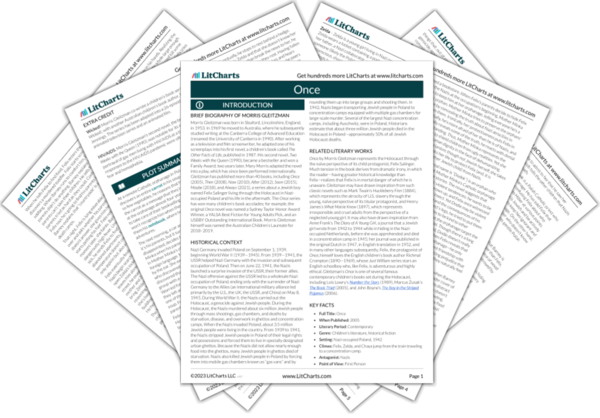In Once, people who commit individual violent acts don’t always intend harm, while people who avoid violence and commit seemingly kind acts are sometimes complicit in systematic evil. Because of this, the novel suggests, it’s important to understand people’s contexts and motivations before judging their actions. The novel’s protagonist, a Jewish boy named Felix living in an orphanage in Nazi-occupied Poland, fears the nun who runs the orphanage, Mother Minka, because “nuns can have good hearts and still be violent.” Yet while Felix’s words imply that Mother Minka uses problematic corporal punishment on children, she is also risking her life by hiding Felix—and, it is implied, another boy named Jankiel—from Nazis. Meanwhile, Felix’s best friend at the orphanage, Dodie, once pulled the legs off an insect and then tried to reattach them, suggesting that he didn’t understand what he was doing or intend to maim the insect permanently. Despite Dodie’s violence toward the insect, he also makes Felix help him rescue Jankiel from bullies. Mother Minka and Dodie illustrate that when people commit violent acts, it doesn’t always mean that they intend harm or that they are fundamentally bad people.
On the other hand, people can avoid committing violence personally and can even engage in seemingly kind individual actions while participating in systematic evils. For example, the Nazi officer overseeing the loading of Jewish passengers onto a train to a concentration camp commits no physical violence himself, happily receives a story from Felix to send to his children, and at one point offers to let Zelda and Barney go free—yet he refuses to free the other orphans Barney is caring for go with them. And, as a Nazi officer, he is complicit in the mass murder of Jewish people, even if he’s not physically committing the murders himself. Thus, the book suggests that individual violent actions may or may not betray patterns of systematically evil behavior—it doesn’t in the case of Mother Minka and Dodie, but it does in the case of Nazi soldiers—and that people can engage in systematic evil without committing individual acts of violence. Therefore, one must understand the contexts and motivations that inform people’s individual actions before judging them morally.
Morality, Violence, and Complicity ThemeTracker

Morality, Violence, and Complicity Quotes in Once
I don’t argue. You don’t with Mother Minka. Nuns can have good hearts and still be violent.

Unlock explanations and citation info for this and every other Once quote.
Plus so much more...
Get LitCharts A+“We can only pray,” says Mother Minka. “We can only trust that God and Jesus and the Blessed Mary and our holy father in Rome will keep everyone safe.”
I can hardly breathe.
Suddenly I realize this is even worse than I thought.
“And Adolf Hitler?” I whisper. “Father Ludwik says Adolf Hitler keeps us safe too.”
Mother Minka doesn’t answer, just presses her lips together and closes her eyes.











